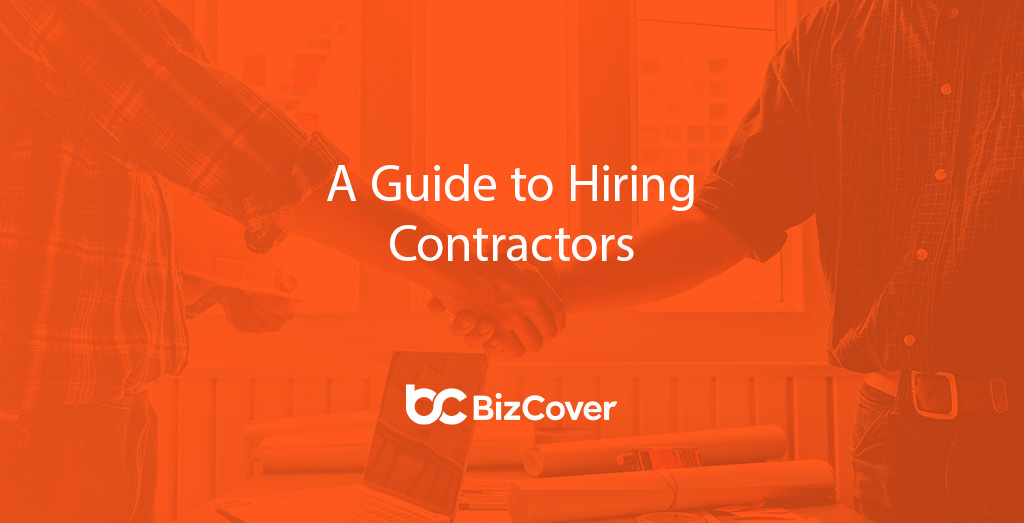Hiring a contractor checklist and tips
If you are looking at expanding your workforce by hiring contractors to help out, it’s a good sign that your business is growing and ready to reach new heights! The process of hiring contractors involves a bit of research and preparation to ensure that you hire the right people for the job.
Our simple guide breaks down some of the main things you need to keep in mind when hiring contractors to help assist your business.
What is a contractor?
A contractor differs from that of an employee. They are being someone that you hire independently on a contract to carry out specific tasks. They often specialise in a particular area of expertise and are hired to provide their skillset on certain projects by external businesses.
The time frame a contractor is offered in their contract can vary depending on the business’ requirements. Some contractors may be involved with a business for a short term or up to several years in some cases.
Hiring a contractor, what are the pros and cons?
Like hiring any worker for your business there are always going to be pros and cons in the process. We’ve rounded up some of the main pros and cons involved with hiring contractors.
Pros of hiring a contractor
- If your business needs access to professional skills and expertise, a contractor can quickly bridge this gap by being able to help your business when it may need it most, especially during rapid stages of growth within your business
- Hiring contractors gives you flexibility. If there are certain tasks that your business needs assistance with but not on a full-time basis, contractors offer you the flexibility to hire on a need-by basis
- Unlike the process of terminating an employee from your business, the process of ending a contract with a contractor is relatively straight forward and can be as quick as a few weeks
- The costs involved are usually a lot less. While you may be paying a higher hourly rate to hire a contractor, you don’t have the added costs that come with hiring an employee like training, personal/sick leave, annual leave, benefits and bonuses.
- As a business you have less exposure to legal liability because contractors will have their own insurance policies in place
Cons of hiring a contractor
- Having contractor workers make up part of your workforce is not the same as having employees. You may find there isn’t as much stability due to the transit nature of contract workers
- Investing time on training, outlining expectations and educating your contractors about the culture of the business can feel like it is wasted if they are only contracted to work with your business for a short period of time
- You may experience a lack of team involvement which can impact on morale
- Contractors will have first-hand experience and access to the workings of your business. This can cause issues of trust even when a non-disclosure agreement may have been signed
- Because contractors may be working for other clients other than just your business, you may not be a priority and could experience issues with urgent tasks needing completion for example
A check list before your contractor starts
Whilst everything may be peachy on paper with your contractor, displaying all the right qualities and required skills, years of experience and rave reviews from previous clients, it still pays to do some research.
To ensure things run smoothly between you, your contractor and your business, it’s a wise move to do some vital checks before they start working. These checks can prevent issues and dramas down the track that no small business owner has the time to worry about.
1. Does your contractor have the right skills and experience for the job?
Depending on the type of job or project that you have hired your contractor for, make sure that they have the know-how to do the job right from the get go. If you have a niche task that they need to work on, double check that their skills are adequate.
The last thing you want is to invest in is a contractor that may not a right fit for the task. This can involve issues like having to re-do the task or in extreme cases having to hire another contractor in the fix the issue.
This can occur with a range of different contractors from all fields of expertise from project consultants, engineers, IT specialists to tradies and life coaches. If you’re ever in doubt of any skill gaps and experience make sure you address them before they become a hazard.
2. Education, qualifications and experience
This one ties in with ensuring your contractor has the adequate skills to do the job. Your future contract worker may have listed many various qualifications and educational experience which is great, but you might want to take the time to ensure that it all checks out.
This can be particularly important for contractors that are hired to carry out very skill specific tasks like using certain types of machinery on a construction site for example. Asking your contractor to provide copies of these qualifications and skills is a step you can take to protect your business from potential hazards and issues.
If the contractor has listed the details of previous clients, it doesn’t hurt to have a chat with them to find out more about your potential contract worker. It’s an opportunity to ask about things like their work behaviour, delivery of tasks and overall performance whilst working for them.
3. Does your contractor have the right insurances in place?
A common condition in many contracts for contractors is stipulating the required types and level of insurance they must have before starting their employment. This will depend on the nature of your business, but two of the main kinds of business insurance that are often required are Public Liability insurance and Professional Indemnity insurance*.
Public Liability insurance is often required by contractors that work closely with third-parties or out on site, for example tradies, retail and allied health workers. It provides a safeguard in the event that they cause accidental injury to a third-party, like a member of the public or causes damage to their personal property.
Professional Indemnity insurance is more common for contractors that offer professional advice and skills. Some of the common types of contract workers that may require Professional Indemnity insurance include architects, engineers, health professionals and accountants for example.
Once your contractor provides a copy of their certificate of insurance, make sure you keep a copy on file and check for the following:
- The details listed on the certificate of currency match that of the contractor e.g. name/business name, ABN, address
- That the insurance policy is current, hasn’t expired. If it is due to renew during the contractors period of employment with your business make sure to request an updated copy upon renewal
- If you require a certain level of cover in place, make sure this is noted on their policy
Things to consider when creating a contract
Like any important business agreement, there are a few things that you need to consider when establishing a contract between your business and a potential contractor.
Some things to keep in mind:
- Pay- be transparent from the start about any money matters. You need to clearly outline the details of the rate of pay, when the contractor will be paid and any other relevant payment details
- The type of work expected- this may seem like a simple one, but clearly outlining the services required by the contractor is one of the main things you will need to include in the contract
- Hierarchy- set out who the contractor needs to report to, their contact details and the expected frequency of communication
- The terms of the agreement
- Termination- this will include the details on the specific circumstances in which either party can terminate the contract agreement
- Expenses- if there are any relevant expenses which may be involved you will need to outline what these may be, who is responsible to pay for them and any other relevant information to assist with the process
- Confidentiality- this is a pretty important one and can vary from business to business depending on the type of work that is being conducted. You may want to advise your contractor that some of the details of your business are not to be disclosed to external parties and are to be treated as confidential information.
Some businesses will also look at drawing up a non-disclosure agreement due to the nature of the work. This is something which you may need the assistance of legal professionals to assist with.
The process of hiring contractors doesn’t need to be a difficult one, but it is important that you do your homework and ensure that you have some checks in place. By taking the time to do your research and having clear guidelines implemented you are helping to establish a transparent and harmonious working environment.
If your contractor requires help with getting their business insurance sorted get in contact with BizCover. We provide a drama-free experience with access to multiple quotes, emailed directly to their inbox. Cover can be arranged in minutes without the need to wait around for the documents to be sent out and signed. Experience insurance made easy today with BizCover.
Recommended reading: Mistakes to Avoid When Hiring a Contractor
This information is general only and does not take into account your objectives, financial situation or needs. It should not be relied upon as advice. As with any insurance, cover will be subject to the terms, conditions and exclusions contained in the policy wording or Product Disclosure Statement (available on our website). Please consider whether the advice is suitable for you before proceeding with any purchase. Target Market Determination document is also available (as applicable). © 2025 BizCover Pty Limited, all rights reserved. ABN 68 127 707 975; AFSL 501769.



